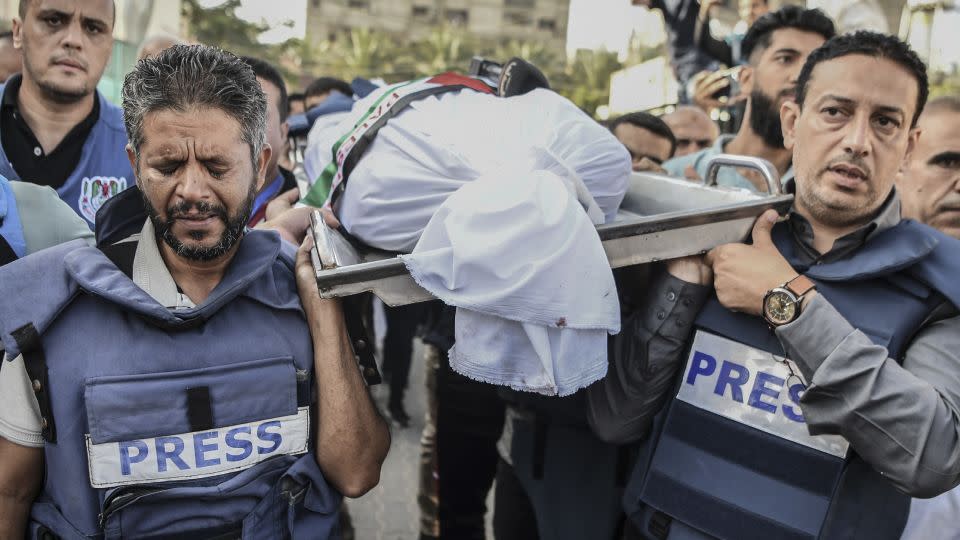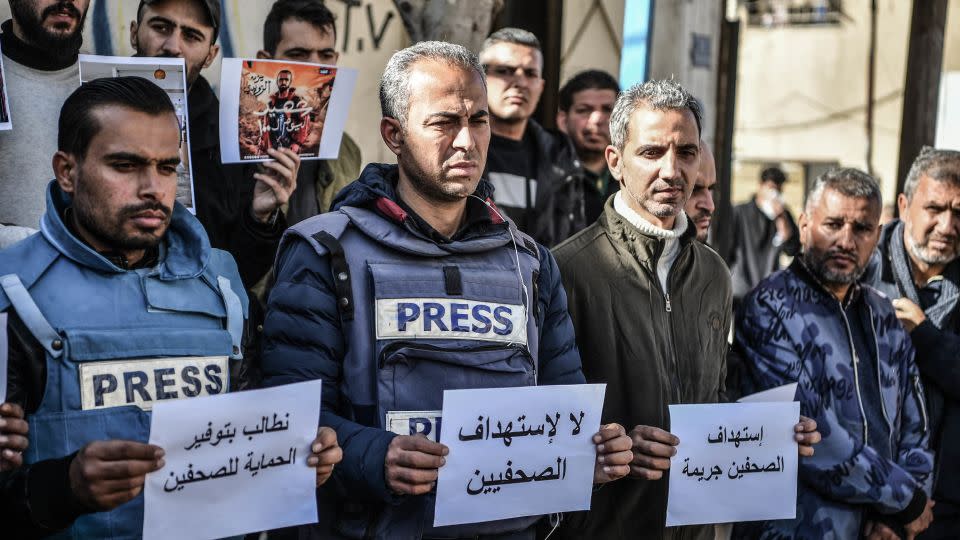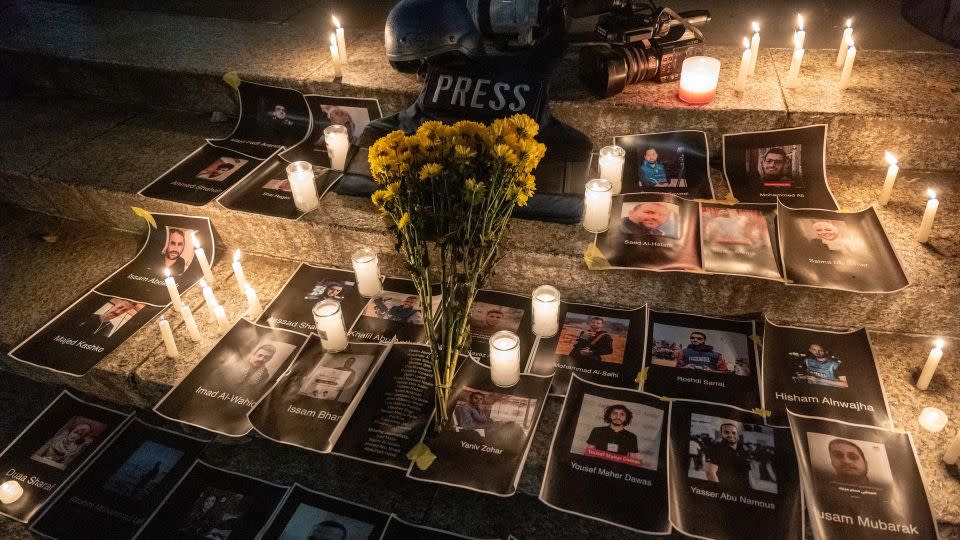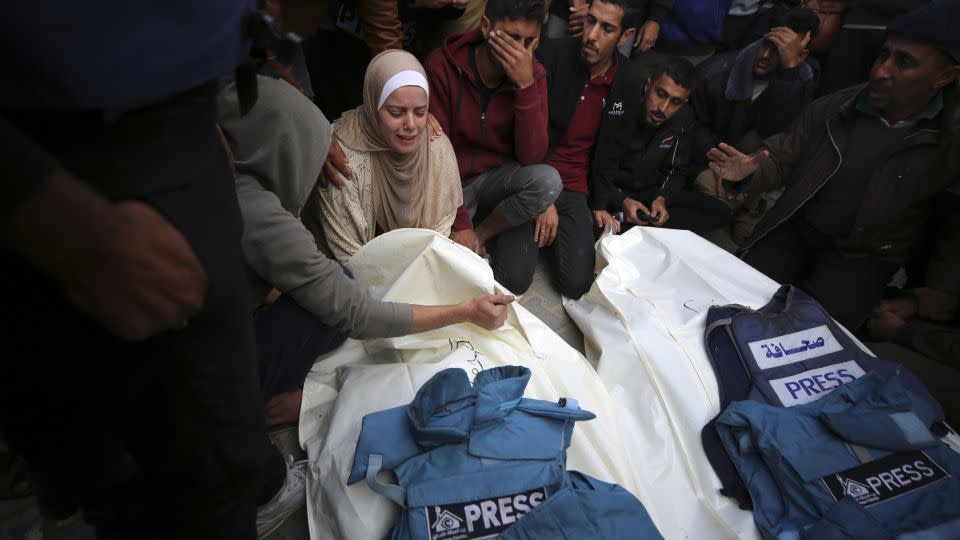Questions mount over Israel’s killing of journalists covering the war on Hamas
Editor’s Note: A version of this article first appeared in the “Reliable Sources” newsletter. Sign up for the daily digest chronicling the evolving media landscape here.
The Israeli military is evading questions and calls for accountability over the killing of journalists tasked with covering the country’s brutal and protracted war with Hamas.
Since the October 7 terrorist attacks, at least 95 journalists — 90 of whom are Palestinian — have been killed in the region, according to the Committee to Protect Journalists, which has been tracking the mounting death toll. The non-profit said it is the deadliest conflict for journalists it has recorded since it started collecting data in 1992.
But Israel Defense Forces has rarely provided specific answers about the circumstances that have led to the killing of journalists. Instead, the IDF has issued vague statements that reiterate their forces do not intentionally target journalists or that the matter is under investigation.

However, with journalists facing extraordinary danger in the field as they attempt to bear witness to the ugly war on behalf of the world, such statements are insufficient. And, over the past week, a pair of new reports have raised significant questions for the IDF about two separate instances that led to the killing of journalists.
The United Nations finalized a report last week about the killing of Reuters journalist Issam Abdallah in southern Lebanon, concluding that the attack was from an Israeli tank that had fired at a group of “clearly identifiable journalists,” a violation of international law. CNN also reported, based on video from the scene, that the journalists were wearing body armor clearly labeled “PRESS.”
In response to the U.N. report, the IDF said it “does not deliberately shoot at civilians, including journalists.” And it reiterated its support for a free press. But Reuters editor-in-chief Alessandra Galloni has demanded Israel more thoroughly explain its actions and hold those responsible accountable. So far, that has yet to occur.

On Tuesday, The Washington Post published a report raising serious questions about a separate attack, a January 7 missile strike that claimed the lives of two Al Jazeera journalists and two freelancers. The IDF initially said that it “identified and struck a terrorist who operated an aircraft that posed a threat to IDF troops.”
But the aircraft in question was a consumer-grade drone, The WaPo reported. And the newspaper obtained and reviewed the footage taken from the drone, which it posted in its entirety online, which revealed “no Israeli soldiers, aircraft or other military equipment” were visible. The WaPo, which spoke to 14 witnesses and colleagues of the slain journalists, also asked two analysts to review satellite imagery covering a 1.2 mile radius of the area, which was captured on the day of the attack. Neither expert saw evidence of military activity and it is unclear how the drone ever posed a “threat” to IDF personnel.
When The WaPo asked the IDF about its findings, however, a spokesperson would only say, “We have nothing more to add.”
Outside such lethal incidents, the Israeli military has also come under increased scrutiny for its general treatment of journalists in the region.

Al Jazeera said Monday that IDF forces detained one of its correspondents, Ismail al-Ghoul, for 12 hours before releasing him. The Qatari-funded network said in a blistering statement that al-Ghoul was reporting from Al-Shifa Hospital when he was arrested by Israeli forces, “severely beaten” and detained with other journalists. When the reporter was released, he accused Israeli forces of destroying his broadcast equipment and subjecting other members of the press to appalling conditions.
“He said the journalists were stripped of their clothes and forced to lie on their stomachs as they were blindfolded and their hands tied,” Al Jazeera reported. “Israeli soldiers would open fire to scare them if there was any movement, al-Ghoul said.”
On Tuesday morning, after checking in with the IDF multiple times, I finally received a comment from a military spokesperson.

“We are not aware of the detention of a man named Ismail Al-Ghoul,” the IDF spokesperson said.
When I asked the IDF spokesperson whether they would acknowledge having detained any journalists at the hospital, I received a statement that did not answer the question. I asked again if the IDF detained journalists but received no reply.
Suffice to say that such responses don’t reflect well on the Israeli military. Obviously, operating in a war zone is extraordinarily difficult. But, as press advocates and news organizations have repeatedly stressed, the targeting of journalists and mistreatment of those who risk their lives to report from the conflict is unacceptable.
“Attacks on journalists are also attacks on truth,” underscored an open letter signed last month by three dozen news leaders, including the heads of CNN, the Associated Press, The New York Times, and BBC News.
Journalists are dying in record numbers covering the war. And with each death, the world sees a little less from the war-torn region. It is incumbent on Israel, which is responsible for the conduct of its military forces, to fully explain its actions when a member of the press is killed.
So far, however, the IDF has been less than forthcoming.
For more CNN news and newsletters create an account at CNN.com
